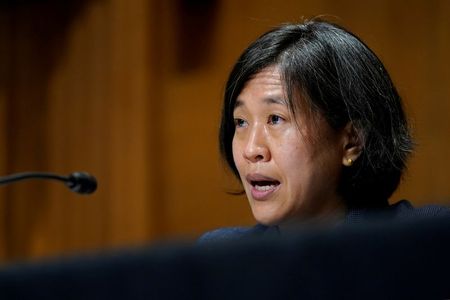By David Lawder and Andrea Shalal
WASHINGTON (Reuters) -Trade ministers from the United States, Canada and Mexico said on Tuesday they held “robust” talks on the new North American trade deal and pledged to fully enforce its higher standards, while downplaying differences over a range of other irritants.
The ministers, in a joint statement issued after their first meeting to review the U.S.-Mexico-Canada Agreement on trade that took effect in July 2020, also vowed to focus on fighting climate change and crack down on imports of goods to the region made with forced labor.
“The USMCA commits us to a robust and inclusive North American economy that serves as a model globally for competitiveness, while prioritizing the interests of workers and underserved communities,” the ministers said.
The statement came after U.S. Trade Representative Katherine Tai met virtually with Mexican Economy Minister Tatiana Clouthier and Canadian Trade Minister Mary Ng in the initial meeting of the governing body for the trade deal, which regulates some $1.5 trillion in annual North American trade.
Their statement described discussions on new labor and environmental obligations as “robust.”
Tai had earlier urged her counterparts to pursue strong implementation of the USMCA to ensure that it would maintain political support.
“For this agreement to be durable, it must serve the needs of everyday people – not just in the United States, but in Mexico and Canada as well. That will only happen if we deliver on our promises,” Tai said.
The USMCA replaced the 1994 North American Free Trade Agreement, adding chapters on environmental, labor and digital commerce standards and considerably tighter regional automotive content rules.
Over two days of bilateral and joint virtual meetings, the three ministers brought up long-standing complaints and ones that have cropped up over the past year, with Tai chiding Canada over a proposed digital tax and Ottawa’s allocation of dairy quotas.
Ng told reporters that she raised Canada’s concerns about “unwarranted and unfair” U.S. lumber tariffs and vowed to defend the sector’s interests. On Monday, she brought up U.S. “Buy American” restrictions on infrastructure and public procurement projects.
Mexico raised differences between the U.S. interpretation of the USMCA’s automotive content rules and the more flexible Mexican and Canadian interpretations, said Mexican Deputy Economy Minister Luz Maria de la Mora, adding that the countries would continue to discuss the matter.
She also said Mexico asked the United States to review its ground transportation rules to ensure that Mexican truckers had access to the U.S. market – a longtime complaint from Mexico City.
TAKING STOCK
But those issues were not mentioned in the joint statement, which focused on cooperation to implement new labor, environmental and digital economy rules and reaching out to underrepresented groups.
The ministers said officials from the three countries plan to meet with small-business owners in October in San Antonio to promote inclusion in USMCA’s benefits.
“This was primarily an opportunity to take stock of the new agreement, think about how it works, and … lay out the priorities of the three countries,” said a senior U.S. trade official, adding that further high-level meetings would likely take place in coming years. Although the USMCA did not include a climate-change chapter at the insistence of the Trump administration, the official said Tuesday’s talks included substantial discussion of climate-change matters. The United States highlighted the importance of labor issues during the meetings, and said Mexico’s response to a potential labor rights violation associated with a union contract vote at a General Motors Co truck plant in the central Mexican city of Silao showed “how well this can be used by both countries.”
(Reporting by David Lawder and Andrea Shalal; Additional reporting by David Ljunggren in Ottawa and Sharay Angulo in Mexico City; Editing by Dan Grebler and Peter Cooney)





